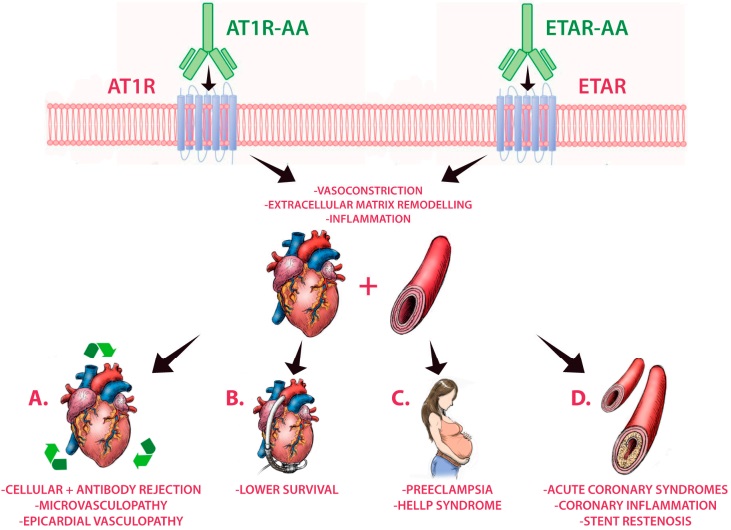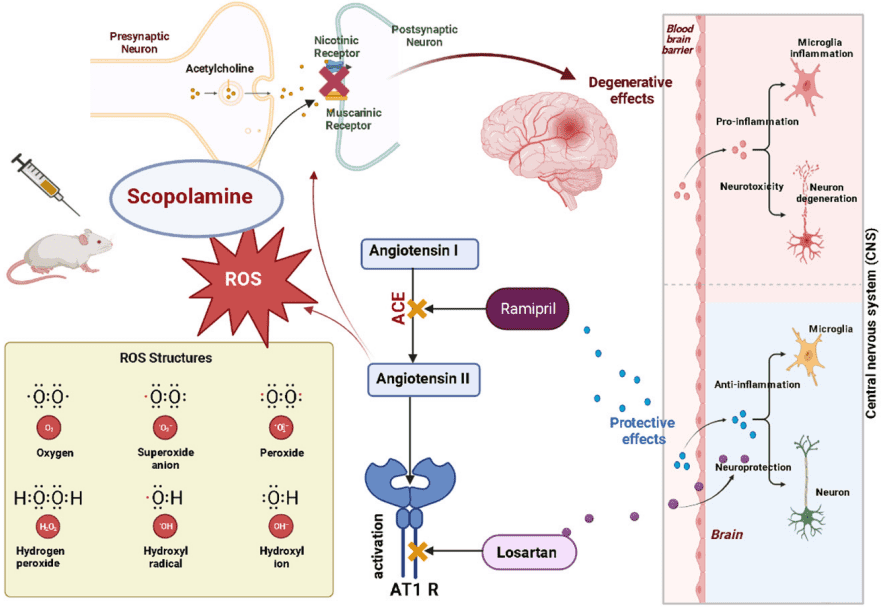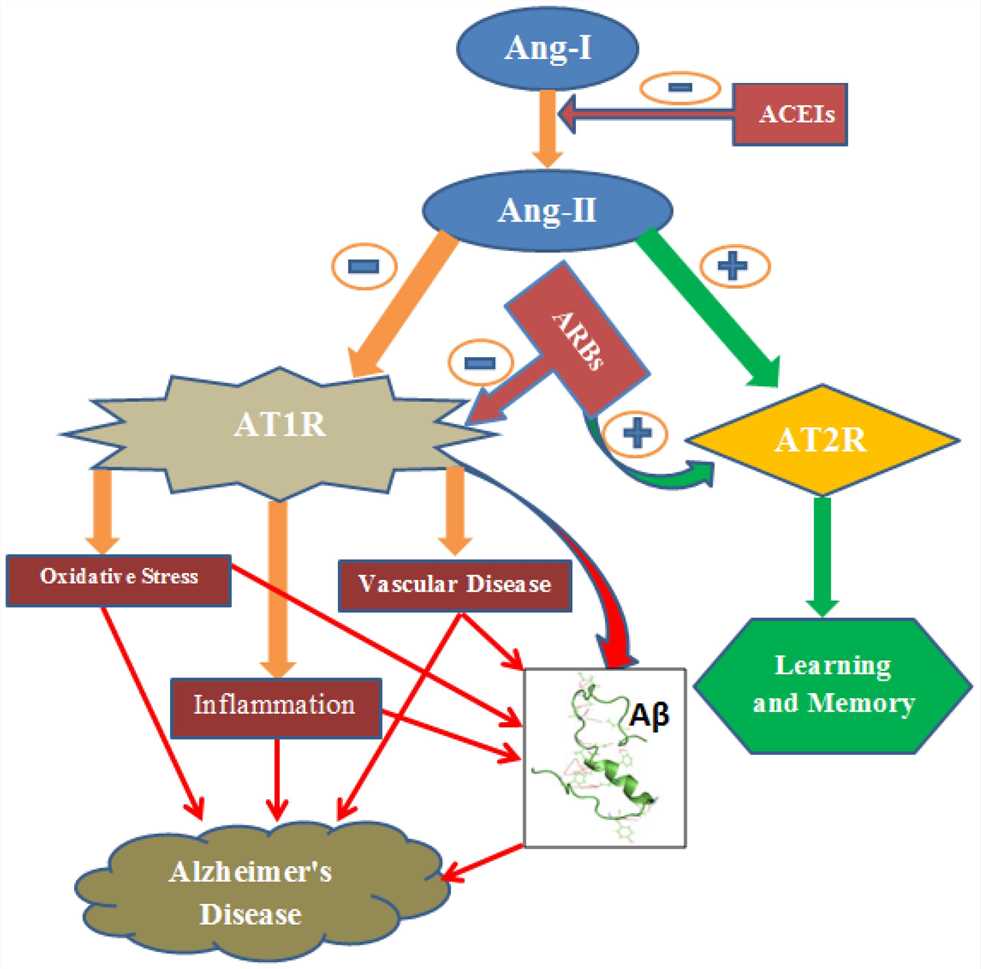NAA Services for Anti-AT1R
Autoantibodies with agonist function are reported in cardiovascular disorders. Since vascular risk factors are associated with an increased risk for Alzheimer’s disease (AD), Creative Biolabs is committed to investigating the potential association between antibodies to the angiotensin 2 type 1 receptor (AT1R) and AD. Equipped with state-of-the-art research and advanced platform, Creative Biolabs has gained significant knowledge and rich experience in natural autoantibody (NAA) related services. Here, we are competent to provide anti-AT1R services for our worldwide customers.
Background of Anti-AT1R Antibody
AT1R mediates physiologic and pathophysiologic actions of its ligand, angiotensin 2 (Ang 2). Overactivity of the AT1R and Ang 2 interaction results in vascular remodeling and hypertension. Antibodies to AT1R (Anti-AT1R-Abs) can mimic Ang 2 and trigger multiple autoreactive and alloreactive responses, eventually leading to cell damage, apoptosis, and hypertension due to allosteric activation of AT1R.
 Fig.1 AT1R activation by functional circulating autoantibodies (AT1R-AAs).1
Fig.1 AT1R activation by functional circulating autoantibodies (AT1R-AAs).1
Anti-AT1R-Abs have been implicated in several vascular pathologies and proposed to constitute an alternative mechanism of graft injury and acute rejection (AR) beyond anti-HLA antibodies. Anti-AT1R-Abs titer might be associated with the risk of antibody-mediated injury. Accordingly, pretransplant assessment of anti-AT1R-Abs may be useful for stratifying immunologic risks. Besides, AT1R have important functional roles in the cerebral microcirculation and in the brain itself. They regulate blood-brain barrier (BBB) permeability and are linked to neuroinflammation, neuronal differentiation and neurite growth. Importantly, AD patients taking angiotensin receptor blockers were found to have reduced AD-related pathology postmortem.
 Fig.2 Renin–angiotensin–aldosterone system modulators and the implication of oxidative stress in cognitive processes.2
Fig.2 Renin–angiotensin–aldosterone system modulators and the implication of oxidative stress in cognitive processes.2
The Role of Anti-AT1R Antibody in Alzheimer's Disease
AD is the most common neurodegenerative disorder and the most common cause of dementia. In addition to age, acquired cardiovascular disorders, such as atrial fibrillation and mid-life hypertension, increase the risk of later development of AD. These risk factors are known to be associated with agonist antibodies to several key G protein-coupled receptors (GPCR) of the vasculature and autonomic nervous system, such as AT1R and M2 muscarinic receptors (M2-MR). There are several possible mechanisms by which anti-AT1R-Abs may influence AD pathology, and the antibodies might represent biomarkers that might benefit from treatment with angiotensin receptor blockers. AD patients have significantly higher levels of anti-AT1R-Abs compared with healthy controls. AD is associated with increased levels of anti-AT1R-Abs, which are correlated with total cerebrospinal fluid (CSF).
 Fig.3 Ang 2 induces oxidative stress, inflammation, and vascular disease via AT1R. (Gebre, 2018)
Fig.3 Ang 2 induces oxidative stress, inflammation, and vascular disease via AT1R. (Gebre, 2018)
What We Can Do About NAA?
Equipped with our well-established platforms and experienced scientists, we can provide comprehensive NAA services, from NAA detection, NAA profiling, to NAA epitope mapping. A wide spectrum of NAA products is available for your choice.
Features of our Anti-AT1R Services Including but Not Limited to
- Different NAA detection methods with high accuracy and specificity
- One-stop pipeline to save your valuable time
- High efficiency without large scale repeats
- Best after-sale service
Since AT1R is thought to be strongly associated with AD development, it has aroused numerous interests in anti-AT1R-Abs analysis for scientific research or clinical diagnosis. With abundant experience in NAA analysis, Creative Biolabs is able to provide a full range of anti-AT1R biomarker services. Our professional team is optimized to help you with high-quality and cost-effective service to make your project a success. Please contact us for more information.
References
- Civieri, Giovanni, Laura Iop, and Francesco Tona. "Antibodies against angiotensin II type 1 and endothelin 1 type A receptors in cardiovascular pathologies." International Journal of Molecular Sciences 23.2 (2022): 927.
- Ababei, Daniela-Carmen, et al. "The Impact of Some Modulators of the Renin–Angiotensin System on the Scopolamine-Induced Memory Loss Mice Model." Brain Sciences 13.8 (2023): 1211.
- Gebre, Abadi Kahsu, et al. "Targeting renin–angiotensin system against Alzheimer’s disease." Frontiers in pharmacology 9 (2018): 440.
Related Services:
- NAA Services for Anti-Aβ Antibodies
- NAA Services for Anti-Tau Antibodies
- NAA Services for Anti-Glutamate Receptor Antibodies
- NAA Services for Anti-Oxidized Low-Density Lipoprotein (oxLDL) Antibodies
- NAA Services for Anti-Phospholipid Antibodies
- NAA Services for Anti-5-HT

